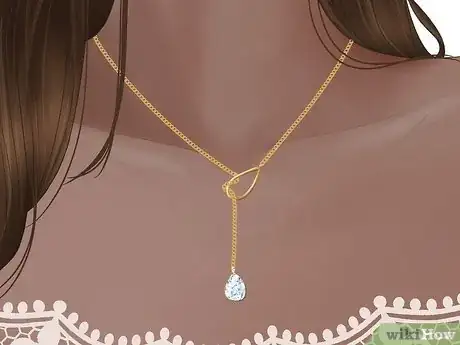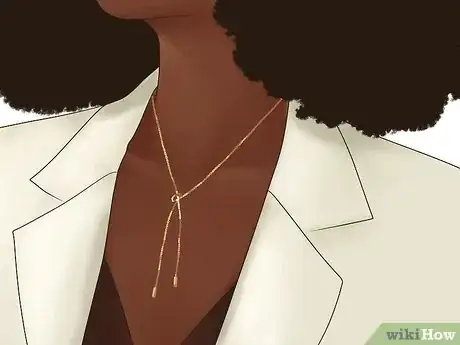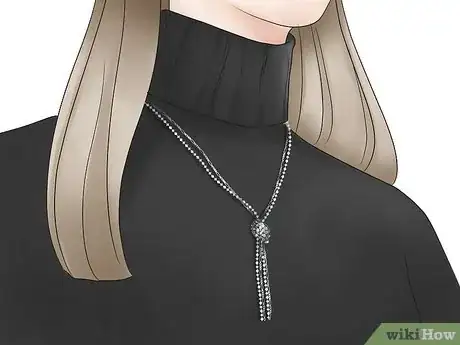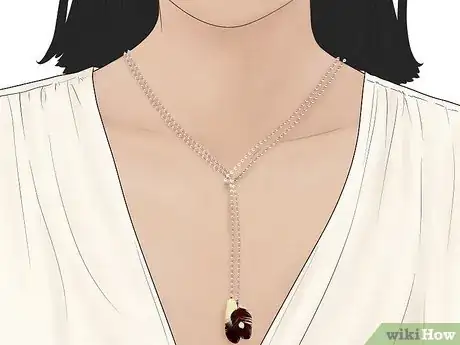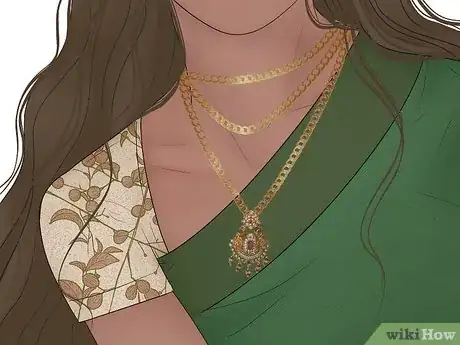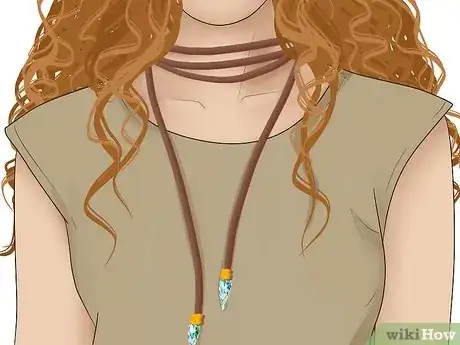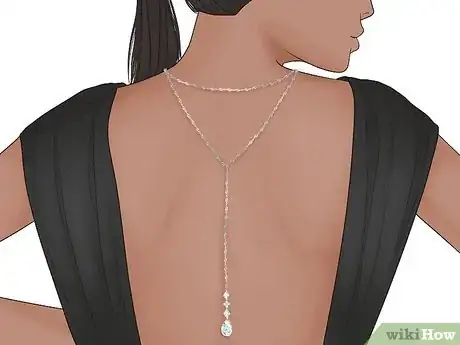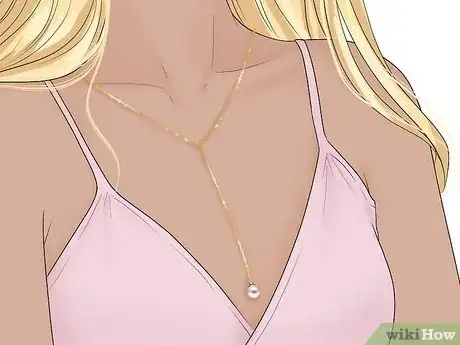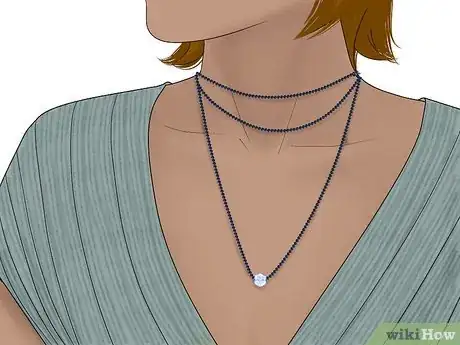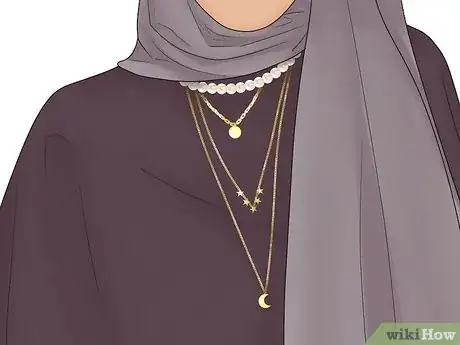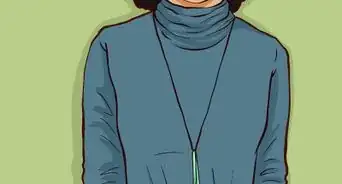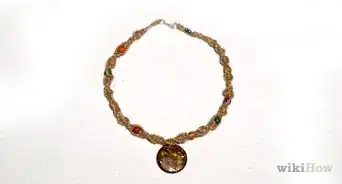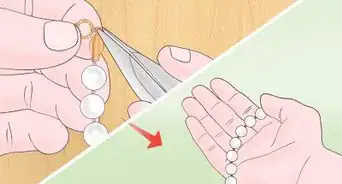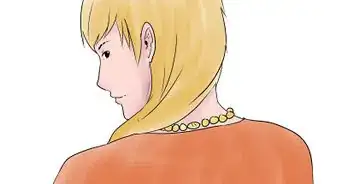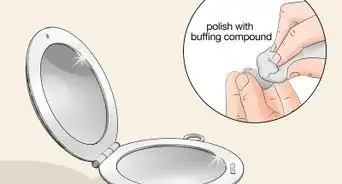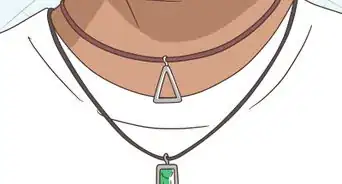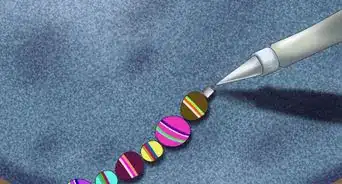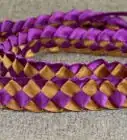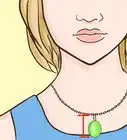This article was co-authored by Katie Quinn and by wikiHow staff writer, Amber Crain. Katie Quinn is an Image Consultant, Personal Wardrobe Stylist and the Founder of Q the Stylist, an image consulting service based in New York City helping men and women understand their specific goals, improve their wardrobe, performance, and life. She has over 11 years of image consulting experience and has worked as a stylist for Trunk Club, Modewalk, and Moda Operandi. Her work has been featured in Vogue, InStyle, Martha Stewart Weddings, Sheridan Road, Slate, Newsy, Rue, and Thrillist.
This article has been viewed 37,040 times.
Lariat necklaces are a must-have in any wardrobe. They’re chic, super versatile, and really easy to pair with different outfits. We’ve put together some tips below to help you style your lariat necklace, experiment with different looks, and choose the best clothes and accessories to pair with it.
Steps
Creating a Basic Lariat Style
-
1Inspect the closure details on the lariat. Some lariat necklaces are meant to be tied a specific way, whereas others can be styled in a multitude of ways. The most basic lariat looks like a long chain, with some kind of open shape (often a circle) at one end. The other end of the chain is meant to be threaded through the open end and then you adjust it to your liking.[1]
- Some lariats do not have pieces on the ends that thread through one another, so these have to be tied or arranged in some other way.
-
2Do a basic loop. This is the easiest way to style a lariat. Drape the necklace around your neck, with the center part at the back of your neck. One end will hang over each shoulder. Grab an end in each hand and cross the chain in front of you. Loop one end under and then through, exactly the same way you would begin to tie your shoelaces. Let the two ends hang down.
- You can adjust the loop higher or lower, depending on what kind of effect you want to achieve.
Advertisement -
3Tie it with a simple knot in the front. If you want to do something a little different with your lariat, try a front knot. The result can look very classy and looks great with formal wear and high-end business suits. Put the lariat around your neck, so that both ends drape over your shoulders and onto your chest. Grab both ends of the chain in one hand. Create a loop with both strands, then pull the ends of the lariat through the loop. This will tie a knot in the front.[2]
- The final look very closely resembles a bolo tie.
- Pair a front-knotted lariat with a black formal gown or dressy business ensemble.
-
4Create drama by double looping a long lariat. Fold the chain in half, so that both strands are running parallel to one another. Hold one end of the doubled necklace in each hand, then wrap the folded necklace around your neck. Pull the ends of the lariat to be in front. In the opposite hand, the doubled chain has created a loop. Pass the ends of the lariat through the loop. Feed them all the way through and allow the ends to hang down.[3]
- This is also called the “scarf” style, since it follows the same pattern as a popular scarf-tying technique.
- This can create a dramatic, chunky style. Pair it with jeans and a leather jacket to create one look.
- You could also wear it this way with a tight cocktail dress and create a similarly dramatic result, but with a different vibe.
Experimenting with Alternative Styles
-
1Wrap it in a choker style. Take one end of the lariat in your hand and place it right below your collarbone. Then wrap the rest of the lariat around your neck once (or twice, if your lariat is a lengthy one). Loop one of the strands over in the front. This will secure the lariat in place.
- This style is easy to create and works great with low necklines, so that the “choker” aspect is clearly visible.
-
2Try “the wrap around” style. Grab an end in each hand, then place the center part at the back of your neck. Cross one piece over to the opposite side and wrap it around the back of your neck. Pull the end over your shoulder and allow it to hang there. Do the same thing with the other piece. You can leave it like this, or you can loop one strand over the other to secure it.
- Allow the ends to hang down after you loop the strands.
-
3Wear it backwards. Thread one end of the lariat through the closure on the other end, as you normally would. Then rotate the necklace so that the long pieces hang down your back rather than in front. This works great with a low or open back dress, and can be a gorgeous and unique way to show off intricate details on the back of your dress.[4]
- It has been a recent trend among brides to use this technique while with their wedding dresses.
Wearing Complementary Clothing and Accessories
-
1Pair them with a deep v-neckline. Lariat necklaces feature long strands that hang vertically down the front of your body. To show off the necklace, wear a neckline that complements the way it hangs. A deep v-neck is a great choice, since the shape of many lariats create a v-shape themselves. The double v effect can be very visually flattering.[5]
- A v-neckline is only one option. You could also try tops with sweetheart, scoop, off-the-shoulder and square necklines, along with strapless tops.
-
2Try it with a striped top or dress. The vertical lines created by long lariat strands can look really interesting when paired with stripes. While horizontal stripes create the most contrast, vertical stripes mimic the way the lariat hangs, so experiment with both looks to see what you like best.[6]
- Go for a garment with a simple stripe pattern in two colors so the overall effect isn't too busy.
-
3Layer them with other necklaces. Lariats tend to look very striking when paired with multiple necklaces of varying lengths. Try wearing one of your favorite chokers, a pendant and a lariat together with a low-cut or open shirt that allows you to show off the unique jewelry.[7] You could also layer dainty gold or silver chokers with a thin-chained lariat for a trendy and glamorous look.
- Keep your clothing simple and monochrome if you want the jewelry to be the star of the show.
Expert Q&A
Did you know you can get expert answers for this article?
Unlock expert answers by supporting wikiHow
-
QuestionWhen should I avoid wearing a big lariat necklace?
 Katie QuinnKatie Quinn is an Image Consultant, Personal Wardrobe Stylist and the Founder of Q the Stylist, an image consulting service based in New York City helping men and women understand their specific goals, improve their wardrobe, performance, and life. She has over 11 years of image consulting experience and has worked as a stylist for Trunk Club, Modewalk, and Moda Operandi. Her work has been featured in Vogue, InStyle, Martha Stewart Weddings, Sheridan Road, Slate, Newsy, Rue, and Thrillist.
Katie QuinnKatie Quinn is an Image Consultant, Personal Wardrobe Stylist and the Founder of Q the Stylist, an image consulting service based in New York City helping men and women understand their specific goals, improve their wardrobe, performance, and life. She has over 11 years of image consulting experience and has worked as a stylist for Trunk Club, Modewalk, and Moda Operandi. Her work has been featured in Vogue, InStyle, Martha Stewart Weddings, Sheridan Road, Slate, Newsy, Rue, and Thrillist.
Personal Wardrobe Stylist
-
QuestionWhen I thread the end of the lariat necklace through the circle, it doesn't stay in place and easily falls off my neck. Any advice?
 Community AnswerI would recommend doing one of three things: replace the circle with a smaller one (have it done by a jeweler), tie a knot around the circle (thus preventing one end from moving), or adding a large bead that will fit snugly below the circle - wooden and glass beads work well for this. Another option is wrapping the necklace around your neck in a different way.
Community AnswerI would recommend doing one of three things: replace the circle with a smaller one (have it done by a jeweler), tie a knot around the circle (thus preventing one end from moving), or adding a large bead that will fit snugly below the circle - wooden and glass beads work well for this. Another option is wrapping the necklace around your neck in a different way.
References
- ↑ https://www.overstock.com/guides/how-to-tie-a-lariat-necklace
- ↑ https://www.overstock.com/guides/how-to-tie-a-lariat-necklace
- ↑ https://www.overstock.com/guides/how-to-tie-a-lariat-necklace
- ↑ http://www.refinery29.com/lariat-necklace-jewelry-styling-tips
- ↑ https://www.happinessboutique.com/blog/layered-necklace/
- ↑ http://www.purewow.com/fashion/how-to-wear-a-lariat-necklace
- ↑ http://www.refinery29.com/lariat-necklace-jewelry-styling-tips
